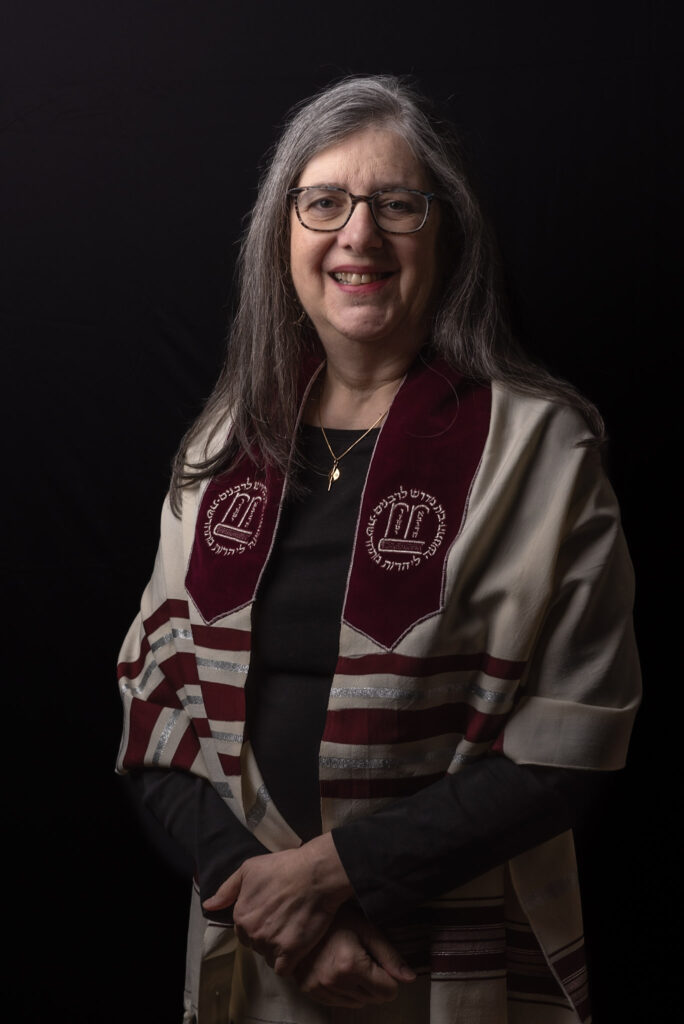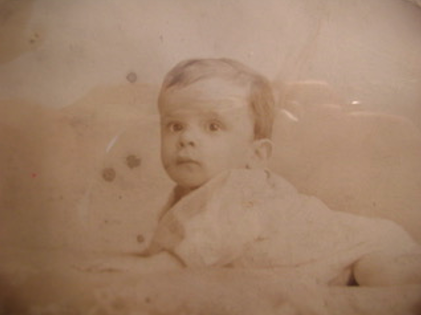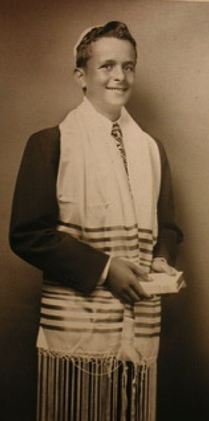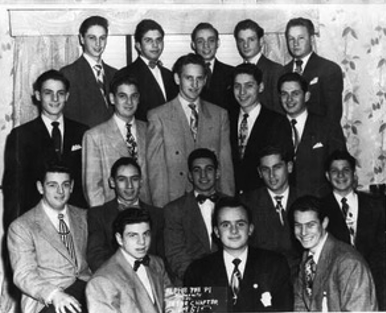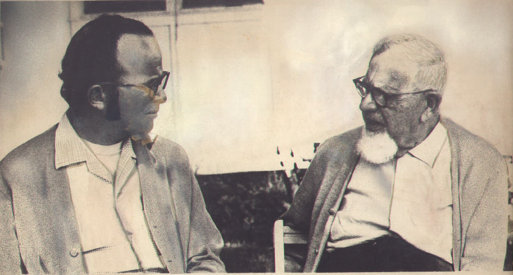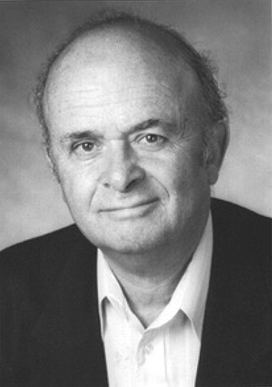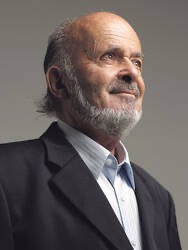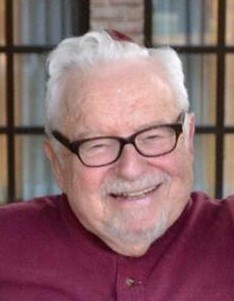What a journey our father took over his lifetime. In many ways he lived out a classic Jewish story, starting out as the child of immigrants in the Bronx, making the most of the opportunities America offered, entering the professional class and passing on his good fortune to his children. In other ways he remained a child of that immigrant milieu until the end of his life. The through line in Manny’s life is his love for Judaism, Jewish life and the Jewish People.
Manny’s father was raised in the Yishuv in Palestine. Hayim came to America to escape the Turkish draft in the First World War. He was proud of having attended the first modern, Hebrew-speaking school in Jerusalem, the Lemmel School. Hayim went to high school with Moshe Nathanson, credited (some say inaccurately) with composing Hava Nagila. Hayim’s enthusiasm for Nathanson’s music had an enduring impact on Manny, who treasured his mixtapes of this music until the end. Jewish music became one of his great passions – others being Yiddish, Reconstructionism, Theology and Philosophy.
Manny’s parents were ardent Zionists who read The Tog – a Zionist Yiddish newspaper that competed with the better-known Forward. Manny remembered his father taking him to many political meetings, exposing him to the vibrant Jewish atmosphere of New York City. He recalled collecting money for the Yishuv on the subway and sending packages to family in Jerusalem during the war. His parents were also active members of two landsmanshaften (mutual aid society).
Manny’s mother came with her family from Ukraine to Minneapolis. Manny met his grandparents only a couple of times – his parents were too poor and too tied down by their little Bronx grocery store to make the trip to Minneapolis. On one such trip Manny’s grandfather played a cantorial record for him – another important musical moment. Like many immigrant parents, Manny’s parents wanted him to learn English, but they took him to the Yiddish theater and listened to Yiddish radio. Later, Manny used to say that he took up Yiddish to become closer to his mother.
The New York public schools nurtured Manny’s outgoing personality and love of performing. He liked to tell how he always played Santa at Christmas time because he was a round little boy. He learned to play piano – or maybe he just played by ear – and toured as the “Hava Nagila Kid.” He attended New York City’s High School of the Performing Arts and performed the lead role in a long-running show put on in Hebrew (HaOtsar B’meara – the Treasure in the Cave) by the Jewish Board of Education for Hebrew school classes. Manny followed a Jewish educational path that is hard to imagine today: He attended Willets Avenue Talmud Torah, the Marshalliya Jewish High School, and then the Jewish Theological Seminary (JTS).
Manny was fortunate to receive a world-class education, courtesy of New York City. While at City College, Manny heard a lecture by Dr. Max Weinreich– one of the founders of YIVO who took refuge in America– about the Yiddish language. After a chance encounter on the subway, Manny became so enamored with Dr. Weinreich that he vowed to take all of Weinreich’s classes. This was the start of his career as a scholar of Yiddish literature.
Manny realized that his future lay in the Rabbinate and not on Broadway. At JTS he encountered Rabbi Mordecai M. Kaplan, another teacher who changed his life. With his usual dramatic flair, he would tell the story of how he picked up Kaplan’s book, The Meaning of God in Modern Jewish Religion, and threw it down immediately upon reading the first paragraph. He said that as a person training to be a rabbi, he was shocked that Kaplan wrote that the traditional view of God had no relevance to modern Jews. But then, he would say, he picked the book back up because he was curious. Manny began attending services at the Society for the Advancement of Judaism. Ultimately, he became a close student of Kaplan’s, including working for him as editor of The Reconstructionist journal, and indeed becoming a key interpreter and teacher of Kaplan’s ideas. Later, Manny expanded his scholarship in religious naturalism by drawing on the work of Protestant theologian Henry Nelson Weiman. Manny was particularly proud that he was accepted into the fellowship of Christian scholars at the Highlands Institute as a result of this work, and frequently enjoyed attending its annual conferences.
While at JTS, Manny met and married Karen Merdinger, who was studying at the JTS Teachers Institute, headed at the time by Kaplan. Together they embraced Kaplan’s vision of Judaism as a civilization in their own life. During this time, Manny was approached to record an album of Shabbat prayers and songs for the purpose of teaching students learning Hebrew with the newly popular Israeli accent. He composed some original music and conducted a choir of Seminary students to record the album, titled “Beloved of Days.” Just a few years ago one of his compositions, Chai Hashem, was re-recorded by local musician Chaim Fruchter. He also performed with Theodore Bikel on the album Theodore Bikel Sings Jewish Folk Songs.
Following graduation, Manny and Karen – now Kayla, went to Israel where Manny hoped to pursue a PhD. Although that didn’t work out, they came home with their first child, Mirele. Manny remained an ardent lover of the State of Israel and returned there many times.
Manny took a position as the Rabbi of Shaar Shalom Congregation in Halifax, Nova Scotia, where Leizer and Rachel were born. Manny and Kayla became fast friends with Shirley and Dave Sherman and their family. Many years later Manny and Shirley married and Shirley’s children, Beila, Garry, Dawn, Miryawm and Tova became Manny’s as well. While living in Halifax in May 1963, Bull Connor unleashed his dogs and water cannons against peaceful civil rights demonstrators in Birmingham, Alabama.
Manny, a lifelong supporter of civil rights, traveled to Birmingham as a representative of the Rabbinical Assembly to stand in solidarity with Black leaders and the civil rights movement. He told the Halifax Mail-Star that: “We wanted to translate our religious beliefs and values into action. . . We wanted to practice what we preach about freedom, equality and human dignity.” While in Birmingham, the rabbis stayed at the A. G. Gaston Motel, which was then bombed two days after they left. Manny participated with other rabbis in a private meeting with King, the NAACP’s Roy Wilkins, and other leaders, in which the rabbis continued to express support. When a colleague raised the issue of Black anti-semitism with King, King’s forceful and unequivocal response that it was to be eradicated so moved Manny that he mentioned it many times thereafter. He said at the time that Dr. King was “a great religious leader, for whom I have only the greatest admiration.” True-to-form, after the Black and Jewish leaders had exchanged songs of love and freedom, he said he “heard God” in the “songs and prayers of freedom he heard in the Black churches.” He was later awarded life membership in the Nova Scotia Association for the Advancement of Colored People.
After Halifax and short stints in New York and Washington DC– where they taught the Confirmation and Post Confirmation classes at Adas Israel– Manny and Kayla moved to Brookline, Massachusetts and Manny earned his PhD at Brandeis University. His PhD thesis on the Czernowitz Conference on Yiddish– a pivotal moment in Jewish intellectual history– became an instant classic in the field. While a student, Manny made a living leading several congregations part-time. He loved to tell how he once held 3 rabbinic gigs simultaneously: one Reform, one Conservative, and the third Orthodox. Ultimately, he remained the rabbi of Congregation Adas Hadrath Israel in Hyde Park – the Conservative congregation– even after moving away from the Boston area. In 1990, the congregation honored him for twenty inspiring years of service.
Manny taught at the University of Connecticut and then moved to Queens College, as Professor of Yiddish and Jewish studies. While in Queens he took on editing Yiddish Literature in America 1870-2000. This huge two-volume anthology was a project of the Congress for Jewish Culture and was to be carried out by a committee. As time went on, many of the committee members passed away. Manny completed this major work by working with the proofreader of the Yiddish Forward and the cover artist.
Manny also recorded an album “I Love Yiddish” on which he recites Yiddish poetry, sings and plays the piano. This is a wonderful snapshot of his love of Yiddish Language and Culture.
Manny married Shirley in 1982. After her divorce, Shirley had made aliyah and took a job as a social worker in Jerusalem. Manny went to Israel to visit and propose. Shirley was surprised when he asked her to marry him. It was just before Passover and Shirley promised to wind up her affairs in Israel and join Manny in New York by Seder. Shirley encouraged Manny to accept a position as the part-time Rabbi of Reconstructionist Congregation M’vakshei Derech in Scarsdale NY, which he held until retirement.
Manny and Shirley moved to Ring House at the end of 2009. For the first year they faithfully attended B’nai Israel Congregation where Rachel was working. Manny and Shirley then found their home at Adat Shalom where the Rabbis appreciated his mini-sermons offered from his seat in the congregation. He continued to teach and inspire, delivering lectures that were co-sponsored by Adat Shalom. When he could no longer lecture, he began delivering programs on Jewish music for Ring House residents. He was able to indulge his bibliomania by rebuilding the library he had sold upon retirement by purchasing secondhand books, and to enjoy his extensive music collection, movies curated by Shirley, and time with his grandchildren. After Shirley died, Manny was fortunate to receive loving care at Brightview and finally at Larmax Group Homes.
When Manny was declining he would repeat his famous one-liner about Judaism and his worldview. He was particularly fond of saying, “Judaism is ethics wrapped up in beautiful traditions.” Manny’s enthusiasm for Judaism, loyalty to the Jewish People, and enjoyment of Jewish life was the essence of his being. He was blessed to be able to devote his life to this passion, fulfilling the beautiful words of the Psalms: “One thing do I ask of God, it is this that I seek: to live in the house of God all the days of my life, to behold God’s sweetness and frequent God’s house.” (Psalm 27:4)
Rabbi Dr. Emanuel S. Goldsmith (8/15/1935-1/5/2024) was a scholar of Yiddish literature, interpreter of Reconstructionism, teacher of Judaism, and musical composer, who inspired students and congregants with his love of Jewish life in all its forms. He taught on the faculties of Brandeis University, the University of Connecticut, and Queens College. Dr. Goldsmith authored and edited many books and articles, including Modern Yiddish Culture, Dynamic Judaism, and Yiddish Literature in America 1870-2000. He also served on the boards of directors of the Congress for Jewish Culture, the Rena Costa Center for Yiddish Studies at Bar Ilan University, and the Highland Institute for American Religious Thought.
Dr. Goldsmith led congregations in Halifax NS (Shaar Shalom Congregation), Hyde Park MA (Adas Hadrath Israel) and Scarsdale NY (Mevakshei Derech). He was predeceased by his beloved wife Shirley (Zebberman) and her son Garry, and survived by children Mirele (Richard Marker), Leizer (Sharon Bray), Rachel (Howard Ungar), and step-children Beila Sherman, Dawn Rosen (Sam z”l), Miryawm Faerman (Hillel), Tova Sherman (Joe Lang), grandchildren, and great-grandchildren.

